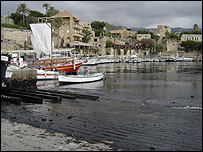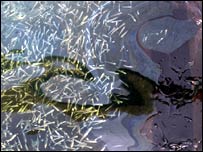|
By Hugh Sykes
BBC News, Byblos
|

The conflict in Lebanon has caused devastating damage to the local economy and environment of the ancient port of Byblos.

The oil slick threatens the historic port town
|
Byblos was not bombed, but it has been deeply damaged by the Israel-Hezbollah war.
The harbour and the rocks and the beaches of Byblos are disfigured with oil.
It spread up the coast in a thick slick after the Israelis attacked storage tanks at the Jiyyeh power station south of Beirut.
Berj Hatjian, the senior civil servant at the environment ministry, tested the slick as it slurped against the harbour wall.
He measured it. It was more than 2cm thick. You can smell it in the air.

Removing the oil will be a dirty job
|
Removing it from the harbour will be a dirty, but straightforward mechanical job - using pumps to suck the oil off the water.
But the oil on rocks and beaches along Lebanon's coast north of Beirut is seeping into the sand and the stone, and it may be impossible to remove it.
Delay is making it more difficult to deal with the oil. Mr Hatjian told me the wait was unavoidable - he did not want to risk taking trucks and teams of cleaners onto the beaches during the conflict.
Deserted
Next to the slick in Byblos Harbour, there is a shoal of tiny, freshly-hatched whitebait fish. Thousands of them. They like to feed in shady water.

Whitebait seeking shade swim under the oil
|
The shade beneath the slick is enticing the fish into danger. The whitebait will absorb some of the poisons in the oil, which will then pass up the food chain when the fish are eaten - by birds, other marine life, or by human beings.
The prevailing current along the Lebanese coast is from the south. The slick has already been reported in the Syrian port, Latakia.
Marine biologists fear the oil could reach Cyprus and even some of the Aegean islands.
Byblos town council has cleared one of its beaches - using bulldozers to shift the oily sand to one side. The beach is fine, and the water is clear, with waves high enough for body surfing.
And now that there is a ceasefire, officials hope the tourists will come back.

The town's popular tourist attractions are deserted
|
Byblos-sur-Mer hotel has beds for 75. When I stayed the night, I was the only guest.
The Crusader castle and the Roman ruins generally have between 500 and 1,000 visitors a day during the summer months. When I walked round, I was the first customer in more than two weeks.
Byblos music festival - featuring US soprano Barbara Hendricks - was abandoned.
And near the old souk, the smart cafes of the town centre were open, and mostly deserted.
Berj Hatjian wants to know why Israel attacked oil storage tanks right by the sea.
He thinks they must have known what the effect would be, that it would punish whole communities that had nothing to do with the conflict.
"It has nothing to do with Hezbollah," he said. "It is just hitting the economy of Lebanon - of ancient Phoenicia."


